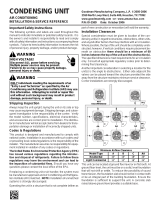
2
• Alwaysreplacethelter-dryerswhenperformingany
repair to the refrigeration system with one capable of
acid removal. After completing the repairs, evacuate the
system to 350-500 microns and weigh in the refrigerant
to the amount specified on the unit rating label.
CAUTION:
To prevent damage to the unit or internal
components, it is recommended that two
wrenches be used when loosening or removing
lines. Do not over tighten!
• Propersizingoftherefrigerantlinesiscriticaltomaintain
satisfactory performance and reliability. Many factors
are involved in determining refrigerant line size include:
length of horizontal run, length of vertical risers, number
and placement of fittings, placement of the condensing
unit to the evaporator, and total equivalent line length.
CAUTION:
To prevent damage to the TXV, brazing should
be done prior to the attachment of the liquid
line to the fitting assembly.
CAUTION:
It is recommended that a wet rag be wrapped
around the suction line in front of the close
off plate before applying heat. Failure to keep
components cool during brazing may result
in structural damage, premature equipment
failure, or possible personal injury.
• All systems installed in long-line applications must
use only 3/8” liquid lines. Use of larger liquid lines will
significantly increase the system charge and could lead
to liquid refrigerant related failures of the compressor.
Static head and friction losses in liquid lines must be
minimized to avoid refrigerant flashing.
• Thevaporlinemustbesizedsothatrefrigerantvelocities
are high enough to return oil to the compressor. Low
refrigerant velocities can result in loss of lubrication
failures of the compressor. NOTE: The ASHRAE
Fundamentals recommend a refrigerant velocity under
low load conditions of 500 feet per minute in horizontal
runs and 1000 feet per minute in vertical risers. The
approximate cooling capacity loss for various vapor
line sizes and equivalent lengths are shown in Tables
1-4 (pages 3-4). Equivalent length is the total linear
length of vapor line plus additional equivalent lengths
for all fittings and elbows. See Table 7 (page 4) for fitting
lengths.
• Usespecialcaretoisolatetherefrigerantlinesfromthe
structure to prevent vibration and/or noise from being
transmitted to the structure.
RESTRICTOR SIZING
Long refrigerant line runs result in increased frictional
owlosses.Inordertocompensatefortheselosses,the
restrictor(s)mustbere-sizedperthefollowingtables.Ifthe
total equivalent horizontal length is greater than 100 feet,
the restrictor(s) bore must be increased by .001 inches
over the value shown in Table 6 (page 4).
IftherequiredrestrictorsizedeterminedfromTable6is
a non-standard size, round up to the nearest standard
restrictor size.
CHARGING
All split systems are factory shipped with the refrigerant
charge noted on the unit nameplate. This charge is for a
typical application of 15 feet of actual line length. Systems
installed with more than 25 feet of refrigerant line should
be charged following the charging method described in
the installation instructions. No additional oil charge is
required for these applications.
ADDITIONAL COMPONENTS
• Forequivalentlinelengthsabove100feet,acompressor
crankcase heater is required.
• Forapplicationswithaverticalseparationofmorethan
50 feet, an oil trap must be installed in the vapor line at
the 50 foot elevation and every 40 feet above 50 feet.
• For applications with a vertical separation of more
than 75 feet between the indoor and outdoor units, a
liquid line solenoid kit must be installed within 10 feet
of the outdoor unit. An anti-short cycle timer (ASCT) is
recommended for all applications with vertical separation
above 75 feet. Note that ASCT is standard on all heat
pumps and many electronic thermostats. See Table 5
(page 4).








